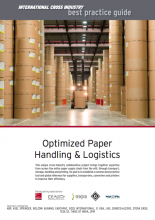
Optimised Paper Handling and Logistics (Paper Guide Project)
Optimised Paper Handling and Logistics (Paper Guide Project)
The best practice guide “Optimised Paper Handling and Logistics” (OPHAL) was released in an Alpha version for industry comment during World Publishing Expo on 7 October 2015 in Hamburg. The review process from October 2015 to January 2016 begin will ensure the final publication delivers a comprehensive and complete guide to best practices across the entire paper supply and process chain.
Optimised Paper Handling and Logistics is a unique international, cross-industry collaborative project involving the whole supply chain – from the mill, through transport, storage, handling and press preparation – to produce a common, best practice tool and global reference for suppliers, transporters and printers to improve their efficiency. It includes paper for publishing and packaging applications for all major printing processes (offset, flexo, gravure, digital) using rolls and sheets of paper and paper board. The result will be an e-book of around 200 pages available at no cost to users.
“A cross-industry manual reduces costs for an individual company, helps avoid confusion and duplication, simplifies training and supervision, and allows a better vision across the entire value chain.” comments David Steinhardt, President of IDEAlliance, and leader of their Paper Transit Damage Working Group.
The project was launched mid 2014. Its goal is to compile and generate generic, global best practices described in a complimentary reference manual. Key to the project is a collective approach requiring only a small industry-wide investment that will deliver cost effective international synergies to answer needs in both developing countries and mature markets.
Global Industry Review
“Around 50 people from 30 organisations have contributed their expertise along with around 20 publications that the guide can draw content from,” said project manager-editor Nigel Wells from the International Centre for Manufacture by Print. “We believe that the content in the Alpha version is about 95% complete but we need to make this 99%+ and this can only be done by inviting members of the global industry to review, correct and complete the base that has been created.”
Substrates are the highest single cost for all printing and packaging applications — any reduction in their waste and damage improves both economic and environmental performance. Paper is heavy, prone to transit and handling damage, and is very susceptible to changes in humidity and to absorbing residual odours such as traces of oil etc. A roll or pallet is handled up to 16 times from when it leaves the paper mill to when it is put on to the press. It is a demanding cargo with a high economical unit value, requiring specialised and correctly maintained techniques, tools and facilities for handling, logistics, storage and preparation for printing.
Modular Content
OPHAL addresses the supply chain with seven modules:
1: Overview Of Paper, Cores, Wrapping & Pallets
2: Damage Inspection & Diagnosis
3: Warehouse/Paper Store
4: Handling Equipment
5: Best Practice Roll & Pallet Handling
6: Transportation: Securing, Rail, Road, Sea, Containers
7: Printer: Paper on to Press & Recycling procedures
The project was initiated by the International Centre for Manufacture by Print and WAN-IFRA, joined by the European Rotogravure Association, IDEAlliance Paper Transit Group, and Nordic Offset Printers Association with companies that include ABP, Axel Springer, Bolzoni Auramo, Earthpac, GOSS, IF, KBA, LHG, Sonoco-Alcore, Stora Enso, Times Of India, UPM.
The current sponsor member list (2015-10-27) includes the following associations and companies:
Associations: European Rotogravure Association, International Centre for Manufacture by Print, Idealliance, WAN-IFRA, Nordic Offset Printers Association.
Companies: ABP (Kolkata, India), Axel Springer, Bolzoni Auramo, Earthpac, FMS, GOSS, Holmen, IF P&C, Intakt, KBA, LHG, Mondi Group, sappi, Sonoco-Alcore, Stora Enso, Times Of India, UPM.
Final e-Book March 2016
“We plan a 3-month review period until mid-January 2016 and then to publish the finalised 200-page e- book version by the end of March 2016 for free download and digital print-on-demand. A classic printed version is being considered on a subscription basis where users will pay only the production and delivery costs with a modest handling fee,” adds Manfred Werfel, Deputy CEO of WAN-IFRA. The initial language will be English and other languages will be added as sub-projects.
If you would like to become a reviewer then please contact one of the project team leaders: Nigel Wells, icmPrint vimw@wanadoo.fr, Manfred Werfel manfred.werfel@wan-ifra.org,



For your review and comments
Attached you find a TEXT version and a COMPLETE version of Chapter 7, Paper onto Press.
1: Post short comments on to the Forum, or
2: Make larger changes on the accompanying manuscript document and send directly to the editor Nigel Wells <vimw@wanadoo.fr>.
Before you start commenting the contenct, please have a look at the instruction in the COMPLETE version: “How to make corrections”.
Manfred Werfel